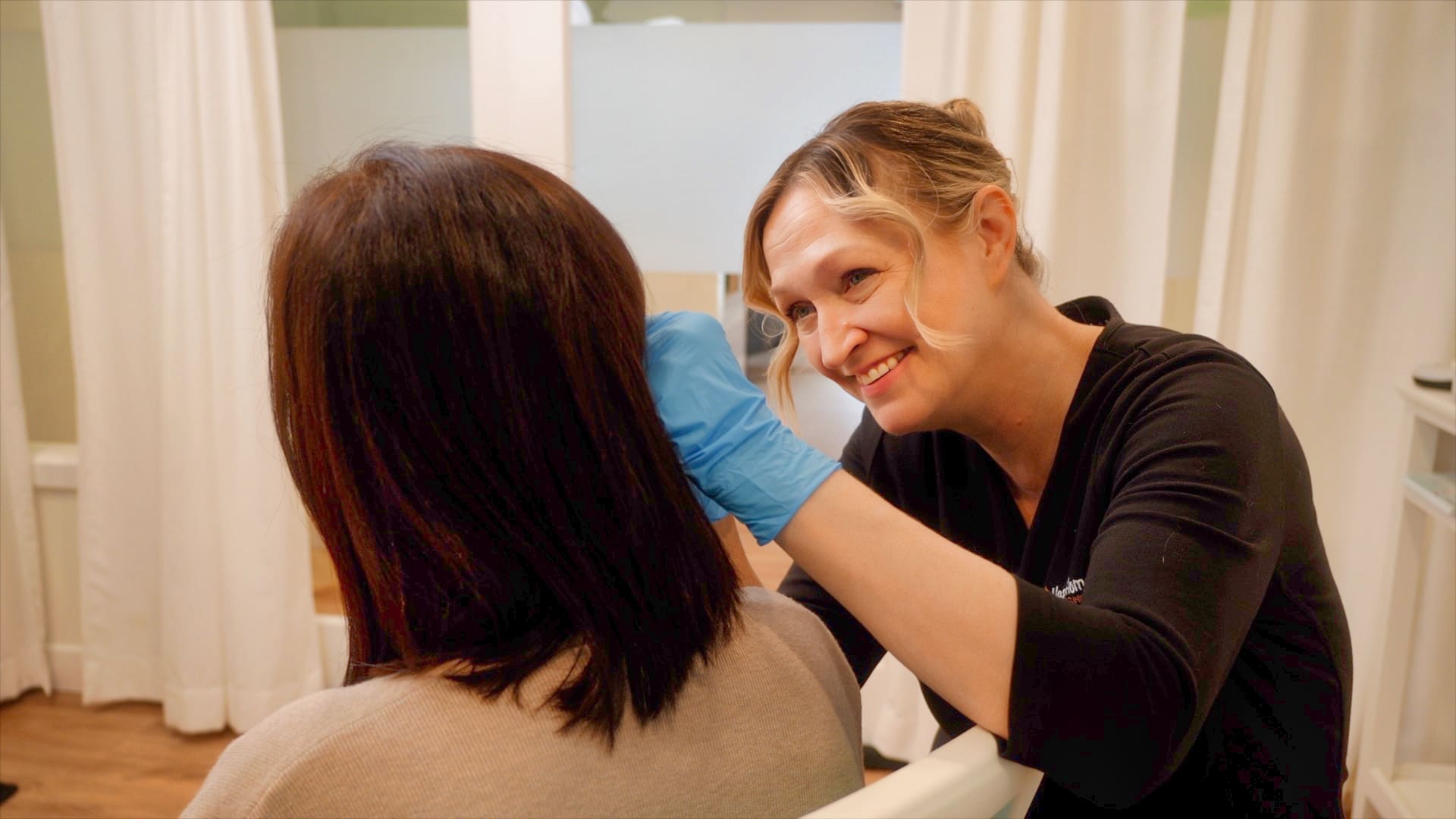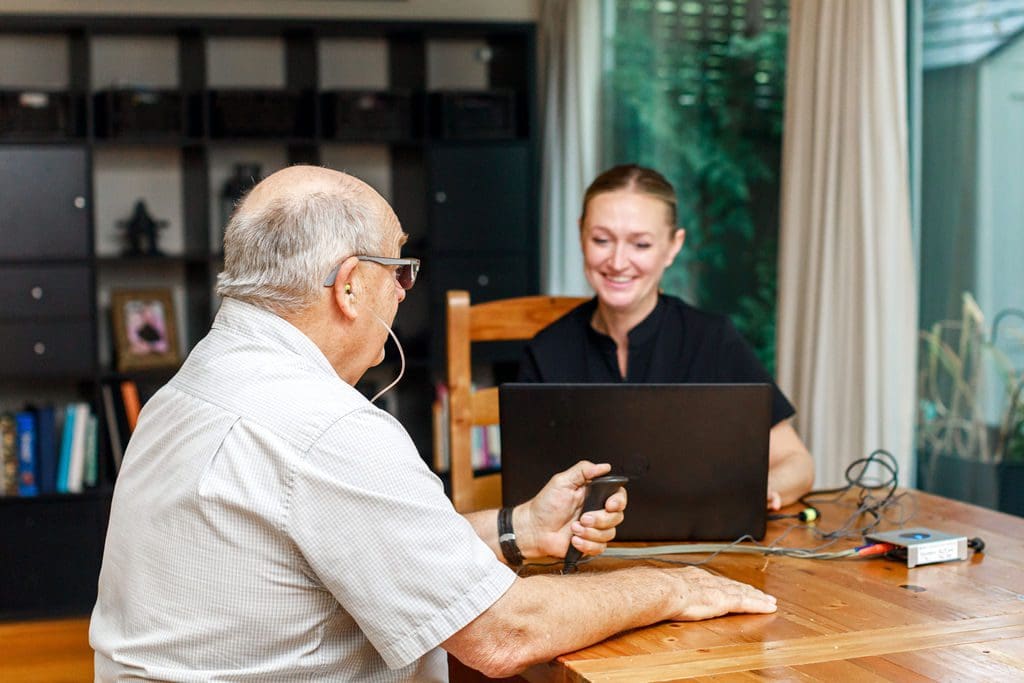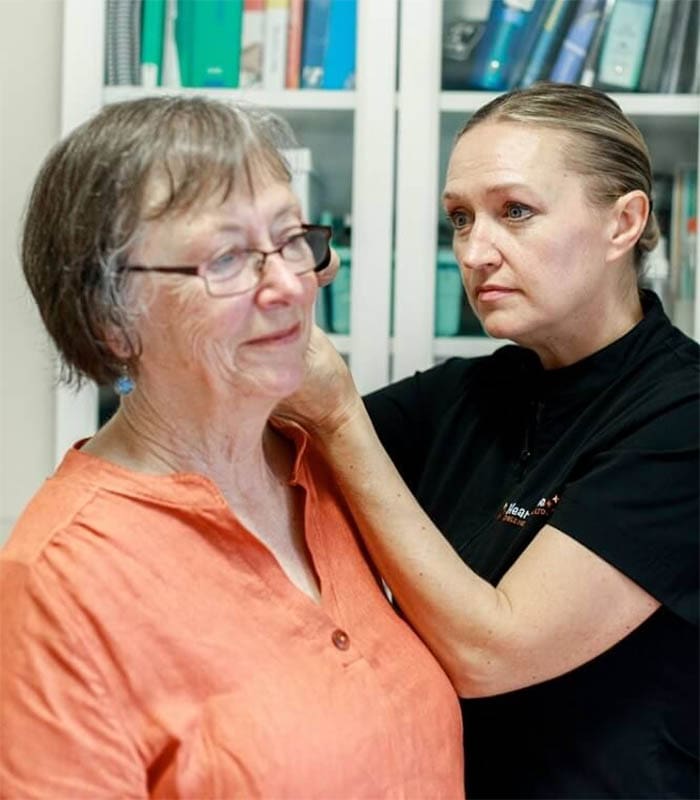
Health Reports in Canada says that an estimated 54% of Canadians aged 40 to 79 (8.2 million) have at least a mild hearing loss in the high-frequency range based on audiometric testing. This extends to approximately 93% of adults in the 70-to-79-year age group experiencing some level of an unperceived hearing loss.
Hearing loss comes on slowly, which means that family, friends and co-workers are likely to recognize it before you do.
Their caring advice, though it might be frustrating to hear, is meant to help guide you toward making a decision that will not only result in better hearing health but also improve your quality of life.
The hard reality is that the only way to know the truth about whether or not you have a hearing loss is through regular non-invasive hearing assessments.
However, many people put off hearing tests in spite of the fact that leaving your hearing challenges untreated does extensive damage and leads to a more advanced level of hearing loss.
Hear at Home’s hearing specialists provide you with a highly accurate comprehensive hearing assessment by using state-of-the-art equipment that tells the truth about your hearing.
A. Some of the most common signs related to hearing loss include:
A. The most common cause of hearing loss is called presbycusis, which involves the deterioration of the structural components in your ears over time due to aging or genetics, similar to many people’s experiences with their eyesight.
Noise induced hearing loss (NIHL) results from frequent exposure to sounds over 85 decibels (the noise level of the average lawnmower or chainsaw, for example) for more than 15 minutes at a time, or from a sudden extreme noise impact event.
Ototoxic medications can lead to permanent or temporary hearing loss, while other causes of temporary hearing loss can also be caused by earwax or some other object blocking the ear canal, inflammation, and growths or tumors.
A. There are three different kinds of hearing loss.
A.Your audiogram plots out how well you are able to hear sounds at various pitches or frequencies, allowing your hearing specialist to classify your hearing loss in any of five categories, including:
Mild: Trouble hearing conversations in a noisy room or when someone is speaking quietly. In quiet environments, mild hearing loss is manageable.
Moderate: It is harder to hear conversation in group settings. People with a moderate loss tend to have the TV turned up too loud.
Moderately Severe: Hearing and understanding speech is significantly reduced at this level, especially in group environments or when talking on the telephone.
Severe: Normal conversation becomes inaudible, and shouting can still be challenging to comprehend.
Profound: At this level, only the loudest sounds are audible, and shouting may not be heard at all.
A. Although not very common, it is possible. However, the vast majority of people with hearing loss have a loss in both ears (bilateral loss), but one ear might have greater damage, or a person learns to favor one ear as their hearing deteriorates. True unilateral hearing loss may be caused by:
Single-sided deafness (SSD) is when hearing loss in one ear is so severe that a conventional hearing aid will not help, but there are specific hearing aids that may help route sounds from the poor ear over to the good ear using Bluetooth technology.
A. Hearing loss cannot always be prevented, but there are important things you can do to ensure you limit its effect on your life, such as:
A. If your hearing loss is caused by a blockage, such as a wax buildup, a foreign object, inflammation, a growth or tumor (conductive hearing loss), your hearing healthcare professional can drastically improve your hearing ability with some form of intervention, like removing the object, medication to reduce inflammation or a minor surgical procedure.
However, if your hearing loss is the result of damage to the sensory organ and/or nerve in the inner ear (sensorineural hearing loss), the damage is usually permanent. Fortunately, 95% of sensorineural hearing loss cases can be effectively helped through the use of hearing aids, which not only improve your hearing but can also help improve your balance and/or limit cognitive decline.



There are people who put off having their hearing tested because they aren’t sure what to expect during a hearing test. To help put your mind at ease, here is a quick walk through of the process we use at Hear at Home.
Our painless, non-invasive process can be broken down into four basic steps to provide you with the most accurate results possible, including:
Through a friendly conversation about your lifestyle, occupation, family and health history, hobbies and other activities, we not only enjoy the opportunity to get to know you better, but it also helps provide a lot of the critical information we need to provide individualized hearing care that meets your objectives and fits your lifestyle.
After your conversation with your hearing specialist, he or she will conduct a physical examination of your ears, ear canal and tympanic membrane by using a video otoscope (the tapered, cone-shaped magnifying glass with a light on the end, which is now connected to a video monitor). This allows us to evaluate the health of your ear canal and eardrum. We’ll usually follow this up with tympanometer and bone conduction tests to measure the reaction of your hearing structures when stimulated by sounds.
What most people think of as a hearing test involves seating you in a soundproof booth and fitting you with a set of high-quality headphones, but we’re now able to conduct this type of testing in a quiet room within your home. During these tests, your hearing specialist will use an audiometer to transmit a range of sounds or spoken words at various frequencies and volume levels into the headphones. You will be asked to respond to each sound you hear. Your result will be plotted on an audiogram to determine the level of hearing loss you may or may not be experiencing.
One of the great things about a hearing test is that you get the results as soon as the test is finished rather than having to “wait on the lab,” like you do with other medical tests. This allows your hearing care expert to have a candid conversation about the results of your tests and clarify what each part means during the same visit to your home.
Your input regarding any treatment and preventative solutions we discuss is a critical part of establishing a transparent hearing care partnership designed to combine our expertise with your needs, objectives, lifestyle and personal preferences.
Have Hearing Complications? Contact Us Today
Excellent experience from start to finish. Same-day treatment, with Holy patiently explaining every step. My… read more blockage was cleared, and I can hear again. Highly recommend Hear at Home. Thank you!
It was so reassuring to have my hearing tested by the wonderful team at Hear… read more at Home. They did a really thorough job of checking my hearing and explaining the results. 10/10 recommend!
This is the best hearing clinic I have been to. They were very friendly and… read more professional and made me feel safe and welcome. Strongly recommend!!!
As a long term client with Hear at Home, it’s amazing to work with this… read more great team. The business is constantly growing daily and every time I find a reason to go for an appointment the calibre of support, care and interest in my needs exponentially grows. It’s easy to be a client of theirs but it’s incredible the level of professionalism the entire team provides. Highly recommended. Highly appreciated. Highly capable team!
I am so glad that I found Hear At Home! Everyone that I have met… read more there is so kind, respectful, patient and understanding. Overall, my experience with Hear At Home has been amazing and I would not hesitate to recommend their services to others!
Situated in beautiful Dellbrook Plaza of NorthVancouver, this hearing clinic goes above and beyond to… read more ensure everyone in the lower mainland has access to quality hearing health. I had the pleasure to experience my practicum here, shadowing Jennifer Abbott Registered Hearing Instrument Practitioner and owner of this beautiful centre. Jennifer and her staff made me feel as an integral part of her team fostering a supportive and inclusive atmosphere with her selection of experts. The on-site practitioner is a high level professional, and the administration staff ooze well rounded customer service! I give thanks to everyone for sharing with me their invaluable knowledge and skills, as well as the supportive environment and expert guidance which they give to everyone whom they come in contact with. Plenty of doggie treats for those walking by with their furry friends, lots of coffee tea and goodies for anyone who stops in. I highly recommend a visit to see what services they have to support your hearing health, and I also recommend the lovely walk by the brook just behind the plaza. Hope you will find the oasis I found during my time there. Enjoy!
Got mom’s hearing aids here. The staff have all been wonderful. Explained everything to… read more my mom, were very patient, easy parking. When looking around for hearing aids for mom, I know cost*o prices are lower, but for my mom, who has mobility issues, it’s just way better to have a place closer to home, with parking within meters of the storefront, who can get her in the next day or possibly that same day if needed. Mom is very happy with her hearing aids. One of them got damaged & they got me in very fast & had a new one ready at no charge. Very happy we went with them. Now if I could only convince dad he should get them too..
Excellent work done from booking an appointment till getting the wax removed. The staff is… read more very welcoming and kind. Thank you very much for incredible service.
Jennifer provided an awesome in home service. My elderly Dad was in the hospital and… read more his hearing aid was lost. As he has dementia, he can’t live without it. Once we discovered that it was lost and he was discharged, Jennifer squeezed us in the next day to set him up with a new hearing aid. Thank You Jennifer
If you’re homebound, struggle with mobility or are concerned about your safety in public, but need the advanced hearing healthcare a hearing specialist can provide, Hear at Home has you covered.
Have Questions? We can help

Disclaimer
Hear at Home Practitioners are licensed by the College of Speech and Hearing Health Professionals of British Columbia. Any unresolved concerns they may have about the registrant’s practice may be reported to the College: College of Speech and Hearing Health Professionals of British Columbia 900 – 200 Granville St, Vancouver, BC, V6C 1S4
Phone: 604.742.6380
Toll-free: 1.888.742.6380
Email: enquiries@cshbc.ca






© 2025 Hear at Home Mobile Hearing Clinic